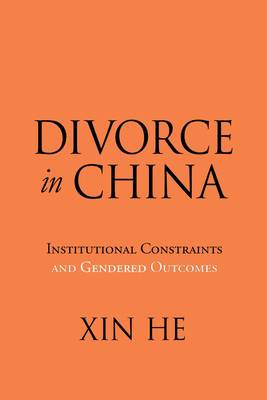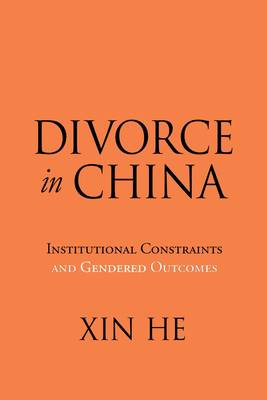
Bedankt voor het vertrouwen het afgelopen jaar! Om jou te bedanken bieden we GRATIS verzending (in België) aan op alles gedurende de hele maand januari.
- Afhalen na 1 uur in een winkel met voorraad
- In januari gratis thuislevering in België
- Ruim aanbod met 7 miljoen producten
Bedankt voor het vertrouwen het afgelopen jaar! Om jou te bedanken bieden we GRATIS verzending (in België) aan op alles gedurende de hele maand januari.
- Afhalen na 1 uur in een winkel met voorraad
- In januari gratis thuislevering in België
- Ruim aanbod met 7 miljoen producten
Zoeken
€ 104,95
+ 209 punten
Uitvoering
Omschrijving
Why are women still at a disadvantage in Chinese divorce courts?
Despite the increase of gender consciousness in Chinese society and a trove of legislation to protect women, why are Chinese women still disadvantaged in divorce courts? Xin He argues that institutional constraints to which judges are subject, a factor largely ignored by existing literature, play a crucial role. Twisting the divorce law practices are the bureaucratic incentives of courts and their political concerns for social stability. Because of these concerns, judges often choose the most efficient, and safest, way to handle issues in divorce cases. In so doing, they allow the forces of inequality in social, economic, cultural, and political areas to infiltrate their decisions. Divorce requests are delayed; domestic violence is trivialized; and women's child custody is sacrificed. The institutional failure to enforce the laws has become a major obstacle to gender justice. Divorce in China is the only study of Chinese divorce cases based on fieldwork and interviews conducted inside Chinese courtrooms over the course of a decade. With an unusual vantage point, Xin He offers a rare and unfiltered view of the operation of Chinese courts in the authoritarian regime. Through a socio-legal perspective highlighting the richness, sophistication, and cutting-edge nature of the research, Divorce in China is as much an account of Chinese courts in action as a social ethnography of China in the midst of momentous social change.Specificaties
Betrokkenen
- Auteur(s):
- Uitgeverij:
Inhoud
- Aantal bladzijden:
- 304
- Taal:
- Engels
Eigenschappen
- Productcode (EAN):
- 9781479805532
- Verschijningsdatum:
- 19/01/2021
- Uitvoering:
- Hardcover
- Formaat:
- Genaaid
- Afmetingen:
- 157 mm x 231 mm
- Gewicht:
- 589 g

Alleen bij Standaard Boekhandel
+ 209 punten op je klantenkaart van Standaard Boekhandel
Beoordelingen
We publiceren alleen reviews die voldoen aan de voorwaarden voor reviews. Bekijk onze voorwaarden voor reviews.









